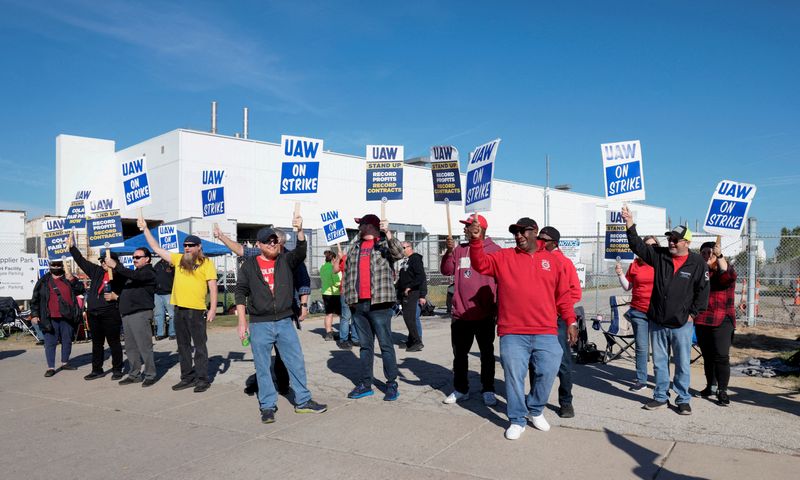By Hyunjoo Jin and Bianca Flowers
CHICAGO (Reuters) -United Auto Workers (UAW) members rallied against the Detroit Three automakers in multiple U.S. states on Thursday afternoon as Friday's deadline loomed for a threatened expansion of the union's strikes.
The seven-day standoff is fueling worries about prolonged industrial action that could disrupt production and ripple through the supply chain and dent U.S. economic growth.
The UAW last week launched unprecedented, simultaneous strikes at one assembly plant each of General Motors (NYSE:GM), Ford (NYSE:F) and Chrysler parent Stellantis (NYSE:STLA).
Approximately 12,700 workers are on strike as a result of the UAW's coordinated U.S. action out of the union's 146,000 members who work at the Big Three.
"If we have to drag this thing out in order to stand up, we will," Ayanna Dixon, a 13-year auto worker and union steward told a crowd near a Ford plant in southeast Chicago under gray skies. "The raise itself to me will be setting an example for my children," she said.
The Chicago plant has not been shut down by the strike and about 100 workers and supporters rallied, holding signs including "Stand up, End Tiers".
UAW workers want to end a tiered wage structure that they say has created a large gap between newer and older employees, forcing some to work two jobs to make ends meet.
In Louisville, Kentucky, at least a couple of hundred workers, family members and supporters gathered at a parking lot near one of Ford's two local assembly plants in support of workers striking elsewhere. Passing cars honked in support and after some speeches, members of the group held hands and sang union songs.
UAW President Shawn Fain has promised an expansion of the strikes at 12 p.m. EDT on Friday (1600 GMT), barring "serious progress" in talks. On Thursday morning, Fain posted a video message on X, formerly known as Twitter, to UAW members about the Friday deadline, showing scenes from several Hollywood movies with the characters saying "tick tock."
GM said it remained in talks with the UAW on Thursday. Ford said its negotiations continue. Stellantis said on Wednesday it made a fifth offer to the UAW on Tuesday dealing with subcommittee demands, and a source familiar with the talks said those talks continued on Thursday.
The White House declined to say on Thursday if President Joe Biden will visit a picket line but said he is "pro-UAW workers." "We appreciate the fact that they still are at the negotiating table," White House press secretary Karine Jean-Pierre said.
Meanwhile, a Reuters/Ipsos poll found significant support by Americans for the striking auto workers.
Stellantis, GM and Ford have furloughed some employees at other factories because of the ripple effects of the strikes, including parts shortages, storage constraints and other issues.
Analysts expect plants that build high-margin pickup trucks such as Ford's F-150, GM's Chevy Silverado and Stellantis' Ram to be the next targets if the walkout continues.
Morgan Stanley analyst Adam Jonas estimated in a Thursday research note that a full month of lost production would cost the three automakers $7 billion to $8 billion in lost profits.
Fain has said Detroit automakers have not shared their huge profits with workers while enriching executives and investors.
GM President Mark Reuss on Wednesday rejected claims by the union that the record profits made by automakers go toward fueling "corporate greed," saying the funds have been reinvested in electric vehicles as well as gasoline-powered cars.
In an opinion piece published in the Detroit Free Press, Reuss also called the UAW's demands for a 40% pay hike "untenable," signaling the two sides remain far apart over the key issue.
The three automakers have proposed 20% raises over 4-1/2 years.
S&P said the strikes were highly likely to last several weeks, potentially cutting third-quarter U.S. gross domestic product by 0.39% and causing "upheaval" across global automotive supply chains.
The impact of the strikes has begun to spread to suppliers. On Thursday, BorgWarner (NYSE:BWA) said any hit on sales is expected to be relatively modest initially. However, it added that if the strikes were to continue for several weeks or expand to affect other customer plants the impact would be larger.

The ongoing walkout at mid-sized truck factories benefits rival Toyota Motor (NYSE:TM), which does not have unions at its U.S. factories and is about to launch redesigned Tacoma pickup trucks, S&P added.
Tesla (NASDAQ:TSLA) investors have said a potential hike in wages and benefits at Detroit competitors would widen the EV giant's labor cost structure advantages.
